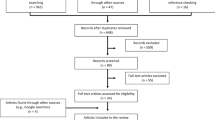Abstract
Using data from the 2004 Survey of Health, Ageing and Retirement in Europe, this paper investigates older workers’ perceptions of job security in eleven countries. We describe cross-national patterns and estimate multilevel models to analyse individual and societal determinants of self-perceived job security in the older labour force. While there are considerable cross-country variations around a median value of 23% of workers aged 50 or older ranking their job security as poor, none of our suggested macro-level explanatory variables—employment rate, employment protection legislation, mean level of general social trust, and proportion disapproving of working beyond age 70—bears statistically significant associations with individuals’ job security. We find some indication, however, that the various societal factors considered here might contribute jointly to explaining the observed cross-national variation. Future research should aim at identifying statistically more powerful indicators of the supposed multilevel relationship between social context and older workers’ perceptions of job security. Moreover, supplementary findings indicate that further attention should be paid to the gender dimension of job insecurity.

Similar content being viewed by others
Notes
See Pichler and Wallace (2009) for related research investigating the reasons for differences in job satisfaction across Europe.
Unfortunately, our data source does not cover any country representing a ‘liberal’ welfare state regime, such as the United Kingdom. However, a recent analysis of data from the European Social Survey suggests that the average level of self-perceived job security in the UK labour force is fairly close to the Continental European average (see Erlinghagen 2008: Table 1). That is, we are unlikely to miss one of the potentially very informative cases at the upper or lower end of the distribution (see Banks and Casanova 2003, as well as Whiting 2005, for overviews of older workers’ employment situation in the UK).
Further potentially relevant country-level variables, such as the unemployment rate in the older population (economic reference frame), a measure of trust in political institutions (cultural reference frame), or the KOF index of social globalisation (social reference frame), were employed in a number of alternative estimations. These, however, did not provide a better fit than those models on which the analyses whose details we present here are based.
In multilevel analysis, the higher-level sample size often constitutes a major restriction. The question of what constitutes a sufficient sample size for accurate estimation is thus an important issue. While the multilevel literature does not provide a definite answer to this question, the number of countries in our study clearly marks the minimum number of necessary group-level observations (cf. Snijders and Bosker 1999: 44; also see the critical discussion in Maas and Hox 2005).
In a bivariate descriptive analysis of our composite social environment indicator (graphical details not shown here), Austria and Belgium exhibit the lowest scores (=3), whereas the three countries with the lowest proportions of older workers reporting poor job security—Sweden, Spain, and Denmark—score highest (≥5). Note that Greece and Italy are not considered here because of missing values.
References
Anderson, C. J., & Pontusson, J. (2007). Workers, worries and welfare states: Social protection and job insecurity in 15 OECD countries. European Journal of Political Research, 46(2), 211–235.
Banks, J., & Casanova, M. (2003). Work and retirement. In M. Marmot, et al. (Eds.), Health, wealth and lifestyles of the older population in England: The 2002 English longitudinal study of ageing (pp. 127–166). London: IFS.
Blossfeld, H.-P., Buchholz, S., & Hofäcker, D. (Eds.). (2006). Globalization, uncertainty and late careers in society. London: Routledge.
Böckerman, P. (2004). Perception of job instability in Europe. Social Indicators Research, 67(3), 283–314.
Börsch-Supan, A., Hank, K., & Jürges, H. (2005). A new comprehensive and international view on ageing: Introducing the survey of health, ageing and retirement in Europe. European Journal of Ageing, 2(4), 245–253.
Börsch-Supan, A., Hank, K., Jürges, H., & Schröder, M. (2010). Longitudinal data collection in continental Europe: experiences from the survey of health, ageing and retirement in Europe. In J. A. Harkness (Ed.), Survey methods in multinational, multiregional, and multicultural contexts (pp. 507–514). Hoboken NJ: Wiley.
Börsch-Supan, A., & Jürges, H. (Eds.). (2005). The survey of health, ageing and retirement in Europe—Methodology. Mannheim: MEA.
Brugiavini, A., Croda, E., & Mariuzzo, F. (2005). Labour force participation of the elderly: Unused capacity? In A. Börsch-Supan, et al. (Eds.), Health, ageing and retirement in Europe–First results from the survey of health, ageing and retirement in Europe (pp. 236–240). Mannheim: MEA.
Charles, N., & James, E. (2003). The gender dimensions of job insecurity in a local labour market. Work, Employment and Society, 17(3), 531–552.
Charles, N., & James, E. (2005). ‘He earns the bread and butter and I earn the cream’: Job insecurity and the male breadwinner family in south wales. Work, Employment and Society, 19(3), 481–502.
De Witte, H., & Näswall, K. (2003). ‘Objective’ vs. ‘Subjective’ job insecurity: Consequences of temporary work for job satisfaction and organizational commitment in four European Countries. Economic and Industrial Democracy, 24(2), 149–188.
Doogan, K. (2001). Insecurity and long-term employment. Work, Employment and Society, 15, 419–441.
Ebbinghaus, B. (2006). Reforming early retirement in Europe, Japan and the USA. Oxford: Oxford University Press.
Erlinghagen, M. (2008). Self-perceived job insecurity and social context: A multi-level analysis of 17 European Countries. European Sociological Review, 24(2), 183–197.
Erlinghagen, M., & Knuth, M. (2004). In search of turbulence: Labour market mobility and job stability in Germany. European Societies, 6(1), 49–70.
Fevre, R. (2007). Employment insecurity and social theory: The power of nightmares. Work, Employment and Society, 21(3), 517–535.
Fullerton, A. S., & Wallace, M. (2007). Traversing the flexible turn: US workers’ perceptions of job security, 1977–2002. Social Science Research, 36(1), 201–221.
Gelman, A., & Hill, J. (2007). Data analysis using regression and multilevel/hierarchical models. Cambridge: Cambridge University Press.
Green, F., Felstead, A., & Burchell, B. (2000). Job insecurity and the difficulty of regaining employment: An empirical study of unemployment expectations. Oxford Bulletin of Economics and Statistics, 62(4), 855–884.
Hank, K. (2004). Effects of early life family events on women’s late life labour market behaviour. European Sociological Review, 20(3), 189–198.
Higgins, L. T. (2004). Cultural effects on the expression of some fears by Chinese and British female students. Journal of Genetic Psychology, 165(1), 37–49.
Hofstede, G., & McCrae, R. R. (2004). Personality and culture revisited: Linking traits and dimensions of culture. Cross-Cultural Research, 38(1), 52–88.
Kalleberg, A. L. (2009). Precarious work, insecure workers: Employment relations in transition. American Sociological Review, 74(1), 1–22.
Klandermans, B., & Van Vuuren, T. (1999). Job insecurity: Introduction. European Journal of Work and Organisational Psychology, 8(2), 145–153.
Larson, J. H., Wilson, S. M., & Beley, R. (1994). The impact of job insecurity on marital and family relationships. Family Relations, 43(2), 138–143.
László, K., Pikhart, H., Kopp, M. S., Bobak, M., Pajak, A., Malyutina, S., et al. (2010). Job insecurity and health: A study of 16 European Countries. Social Science and Medicine, 70(6), 867–874.
Maas, C. M., & Hox, J. J. (2005). Sufficient sample sizes for multilevel modeling. Methodology, 1(3), 85–91.
Mendenhall, R., Kalil, A., Spindel, L. J., & Hart, C. M. D. (2008). Job loss at mid-life: Managers and executives face the “New Risk Economy”. Social Forces, 87(1), 185–209.
Münch, R., & Smelser, N. J. (1987). Relating the micro and macro. In J. C. Alexander, et al. (Eds.), The micro-macro link (pp. 356–388). Berkeley: University of California Press.
Näswall, K., & De Witte, H. (2003). Who feels insecure in Europe? Predicting job insecurity from background variables. Economic and Industrial Democracy, 24(2), 189–215.
OECD. (2004). Employment protection regulation and labour market performance. In OECD employment outlook (pp. 61–125). Paris: OECD.
Pichler, F., & Wallace, C. (2009). What are the reasons for differences in job satisfaction across Europe? Individual, compositional, and institutional explanations. European Sociological Review, 25(5), 535–549.
Rosen, S. (1985). Implicit contracts: A survey. Journal of Economic Literature, 23, 1144–1175.
Royalty, A. B. (1998). Job-to-job and job-to-nonemployment turnover by gender and education level. Journal of Labor Economics, 16(2), 392–443.
Siegrist, J., Wahrendorf, M., von dem Knesebeck, O., Jürges, H., & Börsch-Supan, A. (2007). Quality of work, well-being and intended early retirement of older employees—Baseline results from the SHARE study. European Journal of Public Health, 17(1), 62–68.
Snijders, T. A. B., & Bosker, R. J. (1999). Multilevel analysis: An introduction to basic and advanced multilevel modeling. London: Sage.
Sousa-Poza, A. (2004). Job stability and job security: A comparative perspective on Switzerland’s experience in the 1990s. European Journal of Industrial Relations, 10(1), 31–49.
Sweet, S. (2007). The older worker, job insecurity, and the new economy. Generations, 31(1), 45–49.
Taylor, P. E., & Walker, A. (1994). The ageing workforce: Employers’ attitudes towards older people. Work, Employment and Society, 8(4), 569–591.
Van Dalen, H. P., Henkens, K., & Schippers, J. (2009). Dealing with older workers in Europe: A comparative survey of employers’ attitudes and actions. Journal of European Social Policy, 19(1), 47–60.
Weller, S. A. (2007). Discrimination, labour markets and the labour market prospects of older workers: What can a legal case teach us? Work Employment and Society, 21(3), 417–437.
Whiting, E. (2005). The labour force participation of older people. Labour Market Trends, 112(6), 285–296.
Acknowledgments
This paper is based on data from Release 2.0.1 of SHARE 2004. The SHARE data collection has been primarily funded by the European Commission through the 5th framework program (project QLK6-CT-2001-00360 in the thematic program ‘Quality of Life’). Additional funding came from the U.S. National Institute on Aging (U01 AG09740-13S2, P01 AG005842, P01 AG08291, P30 AG12815, Y1-AG-4553-01, and OGHA 04-064). Data collection in Austria (through the Austrian Science Fund, FWF), Belgium (through the Belgian Science Policy Office), and Switzerland (through BBW/OFES/UFES) was nationally funded. Further support by the European Commission through the 6th framework program (Project RII-CT-2006-062193, SHARE-I3) is gratefully acknowledged.
Author information
Authors and Affiliations
Corresponding author
Rights and permissions
About this article
Cite this article
Hank, K., Erlinghagen, M. Perceptions of Job Security in Europe’s Ageing Workforce. Soc Indic Res 103, 427–442 (2011). https://doi.org/10.1007/s11205-010-9710-8
Accepted:
Published:
Issue Date:
DOI: https://doi.org/10.1007/s11205-010-9710-8




